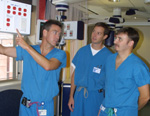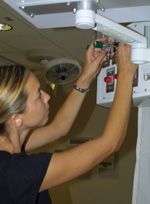Children's Hospital PCICU expands to
12 beds
by
Heather WoolwinePublic Relations
It seems that almost no hospital unit is immune to growing pains, and as the only unit of its kind in the state, the Pediatric Cardiac Intensive Care Unit (PCICU) felt those pains more deeply with each passing day.
But finally a cure for those pains comes from the expansion of the eight-bed unit to 12 beds, still located in the main hospital, but very much a part of the Children’s Hospital culture and environment. On Aug. 25, the new unit space becomes official.
 PCICU director Andy
Atz, M.D., left to right, and pediatric cardiac intensivists Drs. Eric
Graham and Geoff Forbus discuss applications for the new unit’s
technology.
PCICU director Andy
Atz, M.D., left to right, and pediatric cardiac intensivists Drs. Eric
Graham and Geoff Forbus discuss applications for the new unit’s
technology.“We just became a unit of the Children’s Hospital about five years ago,” said Andy Atz, M.D., PCICU director. “So a lot of people don’t know we exist or get us confused with the PICU (pediatric intensive care unit). Some of that is because of our history and our position within the adult hospital. Dr. Fred Crawford had the foresight 20 years ago to create a post-surgical unit that would eventually become a dedicated, full-service cardiac intensive care unit.”
The volume and complexity of cases increased dramatically in the last decade, due in large part to the efforts of Scott Bradley, M.D., PCICU surgical director.
As the MUSC Children’s Hospital sits at the center of a statewide network of cardiologists and hospitals who refer children to Charleston for any type of cardiac surgery, the PCICU is reputed for its multidisciplinary staff and the exceptional level of care they provide. From physicians and nurses to respiratory therapists and social workers, the PCICU staff focuses on a very specific type of patient, thus enabling cardiac patients to receive more acute care in terms of faster diagnosis, prompt therapy, shorter hospital stays, and decreased mortality.
“The care in this unit has always been world-class,” Atz said. “Now, finally, the space matches the delivery of care by this unit. It was a challenging, and very step-wise process in developing the infrastructure that could match the expertise.”
 Jennifer Floyd,
R.N., PCICU, checks and installs oxygen regulators on equipment in the
new pediatric cardiac intensive care unit.
Jennifer Floyd,
R.N., PCICU, checks and installs oxygen regulators on equipment in the
new pediatric cardiac intensive care unit.In addition to the increased bed space, the new unit is equipped with the ability to not only perform echocardiograms at the patients’ bedside, but also in real-time. This is a great leap forward in terms of patient care, as physicians and technicians will look and analyze a patient’s heart structure, function, and rhythm without having to make a tape of the ECHO, deliver it to a viewing room, watch it, and then make a diagnosis or treatment decisions. Instead, the entire process will lessen the time that a physician must wait for information and could impact a very defining moment in cardiac patient treatment.
This December, the new PCICU unit will also boast a family resource room. Complete with computer terminals, family members of patients can remain in contact with other family and business associates or access the Internet to research a loved one’s condition. A small play area will also accommodate patients’ siblings.
Involving numerous people during the last three years, the project was primarily coordinated, planned, and implemented by Kimberly Montgomery, R.N., PCICU nurse manager.
With the opening of the new unit, relief comes with the knowledge that boarding patients in other areas like the PICU or the neonatal intensive care unit will occur less often and that it will only enhance the excellent care provided by PCICU staff.
“What people in Charleston don’t always realize, and I might even say under appreciate, is that the outcomes from the PCICU are as good if not better than any other institution in the country,” Atz said. “Every pediatric cardiologist in the state sends their patients here, and it’s because they know that we’re capable of dealing with any patient who arrives through that door.”
Friday, Aug. 19, 2005
Catalyst Online is published weekly,
updated
as needed and improved from time to time by the MUSC Office of Public
Relations
for the faculty, employees and students of the Medical University of
South
Carolina. Catalyst Online editor, Kim Draughn, can be reached at
792-4107
or by email, catalyst@musc.edu. Editorial copy can be submitted to
Catalyst
Online and to The Catalyst in print by fax, 792-6723, or by email to
petersnd@musc.edu
or catalyst@musc.edu. To place an ad in The Catalyst hardcopy, call
Community
Press at 849-1778.